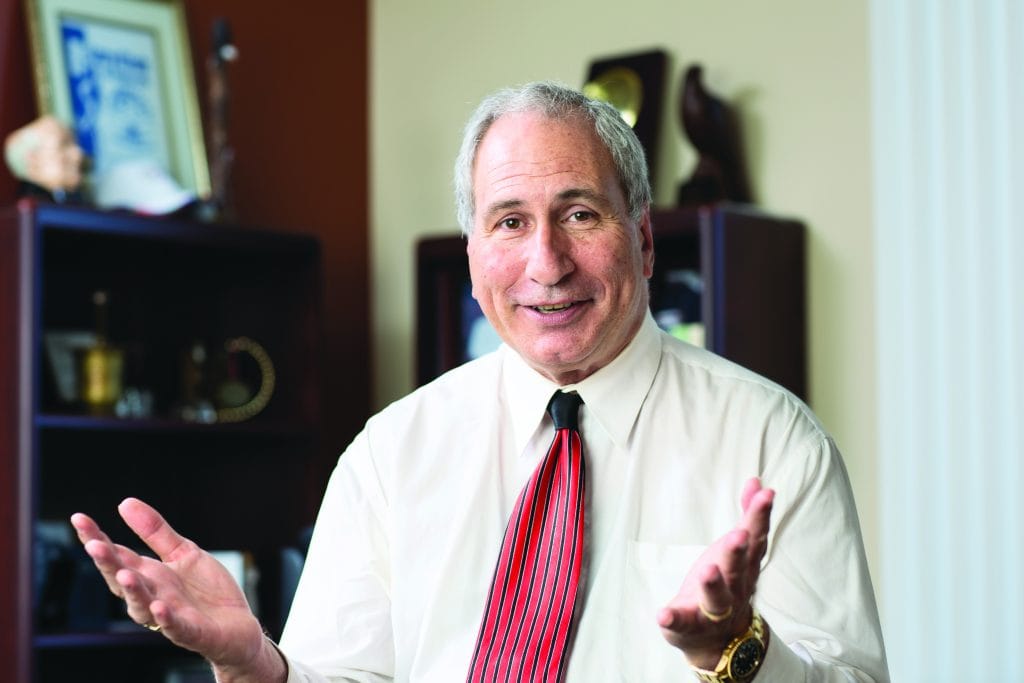Even after 26 years as a politician, Jeff Stone considers himself a pharmacist first. The California state senator, who earned his PharmD from the USC School of Pharmacy in 1981, represents the 28th district while championing healthcare issues as one of only five medical professionals — and the only pharmacist — in the legislature.
He got interested in the business of healing at a young age — influenced in part by his uncle, a physician revered in the family, but also by a memorable early experience. Stone’s grandfather owned a shoe store in Santa Monica and used to take him along on Saturdays. One weekend, when Stone was 5 or 6, he saw a boy about his age with leg braces. His grandfather explained that the boy had polio and would never again walk unaided.
“I asked, ‘Why can’t they just give him a pill and make him better?’” Stone remembers. “My grandfather said: ‘Well, they don’t make that pill yet. Maybe you’ll have the opportunity I
didn’t have to get an education and one day help discover a cure.’”
Spurred on at that early age, Stone says, “I knew I was going into the healthcare field in some way.” Meanwhile, watching his grandfather run a successful business gave greater specificity to Stone’s youthful plans.
Two years after earning his PharmD, Stone opened his first small business, Temecula Pharmacy. “I moved here because I wanted to have a Cheers kind of relationship with my customers, where people walked in and you knew their name,” he says, referencing the then-popular television series set in a Boston bar. “I wanted to be part of a community — to be the community pharmacist.”
He later owned a total of six pharmacies, five in Riverside County and one in Orange County. He still maintains one, Innovative Compounding Pharmacy in Murrieta.
“Establishing a compounding-only pharmacy allowed me to use the general chemistry, biochemistry, microbiology and other pharmacy classes as tools to prepare and make drugs,” Stone says. “It reinforced for me that this was just a great profession to pick.”
“I’m a pharmacist first, politician second.” -Sen. Jeff Stone
The pharmacy profession also proved invaluable when he entered politics.
After attending a city council meeting to urge action against rampant graffiti, Stone decided to run for a seat in 1992. “According to the Gallup poll, pharmacists are the most respected profession out there, year after year,” Stone notes.
He defeated the city’s mayor pro tem and ended up serving 12 years on the city council. Then he ran for the Board of Supervisors for Riverside County. “I was the board appointee to the county hospital, which was struggling,” he says, recalling one of his proudest accomplishments. “With my leadership, I was able to help turn that hospital around into a profit-making entity that expanded clinical pharmacy programming and saw pharmacists doing rotations with physicians.”
In 2014, he won office in newly redrawn state senate district 28. (The only election he has lost to date was a bid for California’s 36th congressional district in 2016.) The 28th district extends from southwest Riverside County to the Arizona border, including Temecula, Murrieta, Lake Elsinore and Palm Springs.
He prides himself on bipartisan efforts to benefit patients. He teamed with a Democrat, Hannah-Beth Jackson of Santa Barbara, to co-author a drug takeback bill that went into effect in 2016. The legislation allows people to drop off unused pharmaceuticals in specially designed storage containers. He also has co-authored laws that make it tougher for juveniles to buy tobacco products.
Over the long term, Stone expects a “monumental shift” in pharmacists’ ability to bill for clinical care services. But just as politicians must work across the aisle to be truly effective, he knows that expanding pharmacists’ range will support fellow healthcare providers rather than usurp anyone’s role.
“In no way has this ever been about thinking we’re the super- heroes of the medical profession who can solve everything by ourselves,” he says. “But we bring a certain expertise to the table that complements that of other healthcare professionals. The goal for all of us is to work collaboratively in the best interest of the patient and to deliver better healthcare.”
As Stone continues working on legislation promoting healthcare and other priorities, he remains true to his roots. “I’m a pharmacist first, politician second,” he says. “If I had a choice of being one or the other, I would have stayed a pharmacist.”


